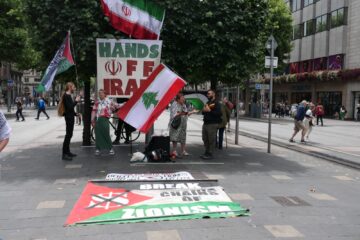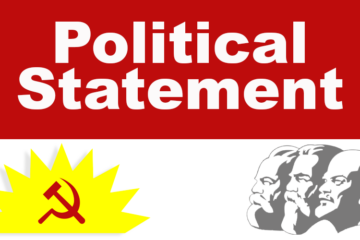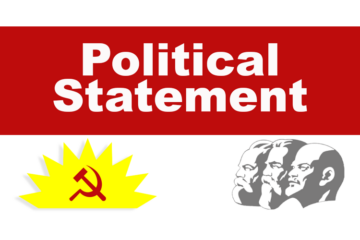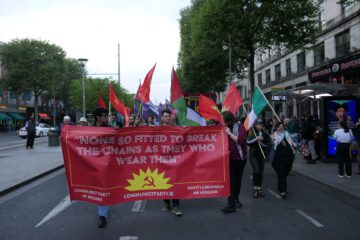In what was a good turnout for the first public meeting at the James Connolly Festival in three years as a result of the COVID-19 pandemic, the Project Arts Centre in Dublin played host to a discussion on housing. The New Theatre did not have the capacity for the event due to a higher than expected attendance.
Jimmy Doran, member of the Communist Party of Ireland’s National Executive Committee, academic and author on housing Dr Rory Hearne, and Sinn Féin housing spokesperson and author on housing Eoin Ó Broin TD spoke at the event.
The meeting was chaired by Orla Byrne from CATU Ireland. Each speaker was given ten minutes to outline their position. Later there was a questions and answers session. Mr Doran Stated the following:
Comrades & Friends,
This is not the first time the citizens of Ireland were faced with a housing emergency and it was
solved back in the 1930s and 40s by building public housing and it can be done again.
From the 1930s up until the 1950s 55% of all housing was built by the state. In 1961, 18.6% of
all citizens lived in a publicly owned home.
Last year the government aimed to get 33,000 homes built. They didn’t, they only managed to
get 20,443 built and of these a mere 1198 were built by local authorities.
Property ownership is key to the housing crisis. Who owns it controls it, be it price; rent; type;
size; location or supply…
In the early days of the state, Fianna Fáil still held some revolutionary ambitions, hundreds of
thousands of publicly owned homes were built for the citizens by the state. These homes
provided shelter for our citizens and managed to eradicate the squalor left behind by the British
in the form of the slums and tenements in our cities and towns. Mistakes were made, of course,
some housing estates were built without any facilities for the residents be it shops, schools or
transport etc. But many of these homes were of high quality and tens of thousands of families
have been reared in local authority homes for many decades. What they may have lacked in
facilities they made up with the communities that developed in them. The major mistake that
was made was the income limit that was put in place in order to qualify for a council home.
This building of public housing by the state did not happen by accident or out of the kindness of
the states heart.
The state was forced to, as the tenements were overcrowded and in a
desperate state affecting the health of the residents and they were literally collapsing and killing
people on a regular basis. We had the worst slums in Europe. They were forced to act and like
all capitalist governments when faced with an emergency they adopted socialist models to solve
the crisis. So, they made the decision to build and provide homes for the citizens for differential
rent and end the squalor left by the British. Of course, they had one eye on the ballot box as
always, and building public homes for the people would do them no harm in elections
.
The property class and the church had different ideas. This could not be allowed to happen in
the land of saints and scholars, holy Catholic Ireland or capitalist Ireland so, the lackeys and
protectors of capital spoke up. In 1952, Labour Party Senator James Tunney said “I am a firm
believer in private ownership. Because it makes for better citizens and there is no greater barrier
against communism”. In 1967, Archbishop Lucy of Cork told Eamon De Valera that public
housing was akin to Bolshevism and a property-owning citizenry would make a more compliant
and obedient citizenry. Ironically, there is now a park in Cork named after Archbishop Lucy
where a number of people live on a regular basis in tents homeless as a result of housing
policy. So, this is what his contribution has ended up doing for the housing of the citizens of
Ireland.
De Valera then started selling off council houses to tenants at knockdown prices. Twenty years
before Thatcher did it in Britain, council homes were sold at a fraction of their worth and a fraction of what they cost to build. Those who did not want to buy their council home were
offered a lump sum as a bounty to move out of it. The sale to tenants denied all of these homes
for use by future generations of citizens. The lump sums offered to tenants to move out of their
homes brought the building of new homes to a trickle as existing homes were recirculated
prematurely to those on the waiting list. This was the beginning of the end for public housing
and marked the start of the commodification of the provision of homes for the citizens with it
being transferred to the private sector in a direct transfer of wealth using the working class as a
vehicle via loans and mortgages to the property class.
As I have said, ownership is key. Who owned the property now? The citizens? If only………no of
course it was the banks. Saddled with 30 or 40 years of mortgage the citizens became very
compliant a few short years after the revolutionary period. This created an income stream for
the banks, builders and speculators, the capitalist class, that was denied to them by public
housing. These “new homeowners”, and I say that in inverted commas, were not willing to take
any chances, kept their heads down and worked away diligently now that the mortgage had to
be paid.
Yet, this still did not satisfy the capitalist class as once the mortgages began to be paid off thirty
or forty years later the income stream from mortgage repayments would have ceased or slowed
down to a trickle. A trickle down might be OK, but the capitalist class always wants a flood up.
Something had to be done to open up this income stream again from the provision of homes.
This is why the state, in tandem with selling homes back to tenants, withdrew from building of
public housing from the 1970s on, opening the door to the commodification of homes and
transferring the provision of homes for citizens to the private sector.
We can see from the census in 2016 that this led to a situation where private rented
accommodation is now the main form of tenure in our cities and towns as workers are priced out
of the market, the insatiable greed of the property classes always pushing rents up. We have
come full circle as the 2016 census also found that overcrowding has increased for the first time
in 50 years. So, well done Fianna Fail, Fine Gael and Labour and the others who prop and
propped them up. They have brought us right back to where the British left us off a hundred
years ago.
There is no housing crisis for the ruling class, only for the citizens. The crisis is the housing
policy which causes all these other symptoms be they high rents; homelessness; overcrowding;
squalor or despair. This is the government housing policy. It is working very well for those who it
was designed to benefit – landlords, builders, banks, developers, speculators – the business
class. Best little country in the world to do business in!
It is not caused, as some would lead us to believe, by either cronyism or corruption. The system
is not broken. This is the way it is designed. It is called capitalism. A crisis will not be cured by
treating the symptom. The root cause, the political strategy of the government to transfer the
provision of homes to the private sector, is the problem that has to be tackled if we were going
to solve the housing crisis permanently. The Class issue is always ownership.
This requires an emergency building campaign by the State of publicly-owned housing as was
done from the 30s to the 70s. It must be universally accessible for all with rents linked to
income. We need a new public housing service similar to health, education or transport on an
all-Ireland basis.
The housing crisis is used by many politicians to get elected. They are not necessarily trying to
solve the problem, some of course are, but others have absolutely no intention of solving it. The
proof of this is that the housing problem has not improved over the last decade, it is getting
worse. They only use housing as a tactic to get elected.
At the start of chapter four of ‘Labour in Irish history’, James Connolly quotes The Secret
Manifesto of the Protectors of the United Irish Society of 1791 by saying “When the aristocracy
come forward, the people fall backwards. When the people come forward, the aristocracy,
fearful of being left behind, insinuate themselves into our ranks and rise into timid leaders of
treacherous auxiliaries.” That statement is as relevant today as it was in 1791. Their methods
may have changed slightly in that they don’t insinuate themselves into the ranks of the working
class, but they have convinced their lackeys to do that for them to confuse, distract and to water
down demands.
For example, those pushing the ‘cost rental model’ for public housing – a system whereby the
tenant pays the full cost of building and maintaining the home over a 30-year period even up to
and including the provision of a sink fund that would provide for any unplanned costs such as
reroofing, plumbing, wiring etc. This without ever actually owning the property. For a reduction in
rent of around 25% lower than the exorbitant rack rents demanded by the market and if you
can’t afford them, the state will subsidise them, thus using the low paid worker as a vehicle to
transfer wealth via subsidies from them back to the property classes, who in many cases are
one in the same as those paying the poverty wages to workers in the first place, which makes
rent unaffordable. There is no crisis that capitalism cannot solve so long as the working class
are willing to pay for it.
The cost rental model is a blank cheque for property developers, bankers and landlords.
Employers let totally off the hook again with no contribution from the profits created by
employees towards the provision of homes as the workers, their employees, pay for them in
their entirety themselves, while never actually owning the property at the end of their lives.
No ownership remains in private hands. The corporation like I say is possibly the same one that
makes the rent unaffordable via poverty wages. Another transfer of wealth and power from
workers to landlord, banker and developer aka the ruling class.
The key to this is that the State believes that the contributions that worker’s make through their
PAYE is enough of a contribution from the business class to society, hence low taxation on
employers and business. We in the Communist Party of Ireland continually call for income
linked, differential rents and for the state to be the builder and provider of homes for the citizens.
Ownership is always the class issue, whoever owns the homes controls the cost, rent,
availability and design. That is what the market considers a suitable home for the working class.
Pray tell we can’t let them get above their station.
Once the state owns the property the private sector is excluded and denied access to the
massive income stream and power attained through the provision of shelter. We must break
with the idea of property and land ownership entirely and make it all rental. Differential rents in
Ireland are 15% of income. Today, some people spend as much as 70% of their income on rent
with no security of tenure and they can be evicted at the whim of the landlord. All of this money
denied to the economy goes straight into the pockets of the elites. Others spend 40 years
scrimping and saving to pay off a mortgage on a home that they will only ever own for a few
years prior to death. This money goes directly to the property classes also.
We need to reverse selling public housing to tenants. A key strand to public housing would be
the purchasing by the state from particularly older people or people nearing retirement of the
family home and allowing them to live in it until they depart this life. This will end pension
poverty for many people and also add to the public housing stock of the state.
With a state-owned construction company, building workers will have well paid union jobs and
continuity of work, an end to boom and bust in the construction sector unemployment and the
emigrant ship.
With the state now building enough homes to house the people on an annual basis property
price will stabilise and fall, the private rented accommodation used by landlords to suck the
blood from citizens through excessive rents will now be worth only a fraction of their previous
value. The state should have no hesitation in buying these properties for knock down prices and
add them to the public housing stock. What goes around comes around.
With differential rents, citizens are freed from the burden of massive debt and or excessive rents
at the behest of landlords and banks.
With more disposable income in the citizen’s pocket as a result of reduced rents this in turn puts
more money into the local economy, providing more jobs and security for society as a whole.
This is the ultimate transformative demand which can free the Citizens from the burden of
poverty and insecurity of shelter and be a foundation stone to end inequality and poverty.
Societal wellbeing and health will improve with the burden of debt, uncertainty and unaffordable
rents becoming a thing of the past. As free time grows, quality of life will improve and
emboldened workers can reach their full potential and achieve new goals only ever dreamed of
in the past.
We can only imagine what the true cost of poverty on the people of Ireland might be. The
person with the potential of creating the cure for cancer may be living in poverty – underpaid,
undervalued, exhausted and destitute at the hands of the greedy landlord and the exploitative
employer and never getting a chance to reach their full potential.
There is one clear proven solution to end the housing crisis: the state building public housing.
Can it be done?
In 2006, 93,419 homes were built in Ireland. The narrative has been created by the state that
there is a shortage of construction workers. There is no shortage of construction workers but
they are building for the needs of capital, not society. Most of them are building hotels, data
centres and office blocks, which should not be the priority, but they create massive profits.
There is a housing emergency caused by the government housing policy and in times of
emergency the state needs to act. It’s ironic that anytime there is an economic or social
emergency, socialist policies are enacted by the government, whether nationalising the banks in
2008 or taking over the private hospitals during the pandemic or building public housing
between 1930 and 1970. The problem is the capital class only do this as a temporary measure,
a short-term compromise with the working class.
Who here would complain if we were to keep the Beacon Hospital, AIB bank, or all the Council
houses in public ownership for perpetuity, a state asset to benefit society as a whole? Instead of
socialising debt and subsidising landlords it is time to nationalise the building of homes with a
state-owned construction company to build and maintain universally, accessible public housing
for the common good. For that matter, why stop at housing? There is certainly a case to
nationalise all industries and start building an economy for the common good.







